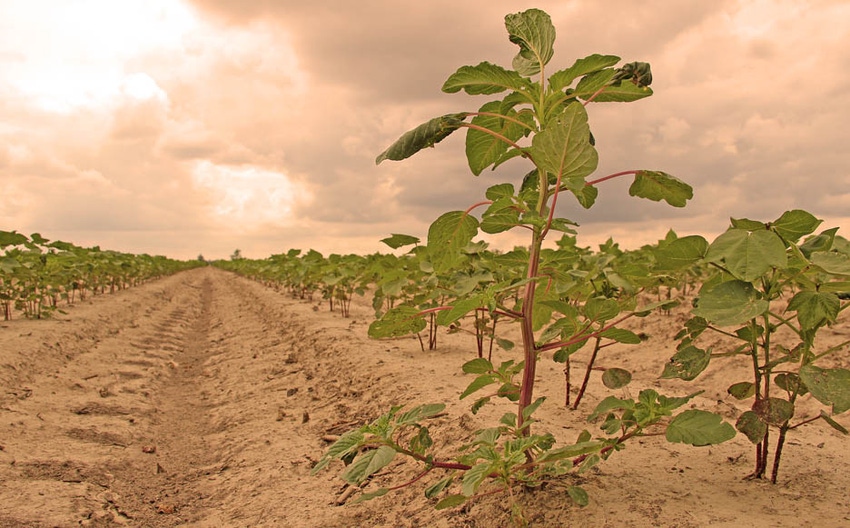April 30, 2013

When the biotechnology antagonists try to stoke fear by warning about “superweeds,” they make these plants sound like an alarming cross between the unruly dinosaurs in “Jurassic Park” and the carnivorous botany in “Little Shop of Horrors.”
“I was talking to a farmer from Arkansas and he’s got weeds that are now 8 feet tall, they’re the diameter of my wrists, and they can stop a combine in its tracks,” Gary Hirshberg, a leading anti-biotech activist, told U.S. News & World Report last year. “The only way [farmers] can stop them is to go in there with machetes and hack them out.”
Gary is actually right — but this is nothing new, and has nothing to do with biotechnology. Hand weeding has been practiced since farming started. One of the least favorite jobs of my youth was walking through fields cutting out weeds. It is hard work. You are not just battling weeds, but also the weather and insects. Often when you started in the morning the crops you were walking through were soaking wet from dew, and the air was cold. By the end of the day the heat and humidity was stifling, and no matter you were in the field there were flying, crawling and biting bugs. There was nothing noble about hand weeding; it is simply hard, uncomfortable work.
Weeds are among farmers’ oldest foes because they compete with the crops that we grow for food. They suck moisture from the ground, steal nutrients from the soil, and block sunlight from the sky. Our job is to minimize the harm they do in our fields.
We can control weeds from season to season, but the weeds will always be with us. They’ll never suffer a final defeat. We fight them and they fight back. They’re always responding to everything farmers do, in a generational struggle for survival. My dad, who was also a farmer, faced weeds that I’ve never seen and he probably wouldn’t recognize some of the weeds I encounter in my fields.
Farmers are playing chess with nature, in an endless game with new pieces added to the board each year. We will never checkmate nature; instead our goal is to maximize what we produce given the challenges that are part of farming.
Just in my generation farmers have acquired new tools to combat weeds. Herbicides that help control weeds have transformed agriculture. They are safe, effective and reduce the amount of tillage farmers need to do to their fields. Less tillage also means less soil erosion and less energy used to produce our crops.
Superweed propaganda
Scientists in the last few years have developed a new form of crop through genetic modification. It possesses the ability to resist a safe herbicide called glyphosate. This development has allowed farmers to spray glyphosate, killing weeds but not the crops they’re trying to grow.
Suddenly we were able to raise more crops on less land. Glyphosate was so good that we even decreased our herbicide use.
(See here for pigweed photos.)
Within a few years, these GM crops became a conventional part of agriculture. Today, the vast majority of the corn, soybeans, and cotton in the United States are immune to glyphosate. Farmers embraced these crops because they made so much sense, for both economic and environmental reasons.
Yet nature isn’t static. It changes all the time, and so some weed species have begun to build a resistance to glyphosate and other herbicides. These are the “superweeds” the anti-technology activists are warning us about.
Except that there’s nothing “super” about them. They are ordinary weeds and their emergence was expected. Nobody predicted that glyphosate-resistant crops represented a lasting victory over weeds–at least not anybody who understands how nature works.
The people who complain the loudest about these weeds tend not to be the farmers who have to confront them in the fields. I would appreciate their concern if I didn’t also know that they aren’t really worried about my ability to produce nutritious and affordable food. Instead, they’re using propagandistic words and phrases to frighten the public and push a personal ideological agenda in opposition to crop biotechnology.
Their real goal is to enact public policies that will make farming harder, drive up grocery-store prices for consumers, and deny everyone an important tool of land conservation.
If they succeed, “superweeds” will be only one of our problems.
Meanwhile, those of us who work the land rather than play politics must now return to the familiar challenge of coming up with new ways to fight an old battle. And we’ll succeed, as long as we can rely on the twin powers of scientific technology and human ingenuity. That is what farmers do.
John Reifsteck is a corn and soybean producer in Champaign County Illinois. He volunteers as a Board Member for Truth About Trade & Technology.
More from Western Farm Press
Farmer feeds hogs from finest Vegas buffets
5 things moms get wrong at the grocery store
Dairy farmer blends vodka from cow’s milk
You May Also Like




